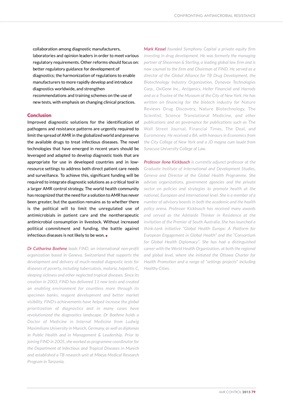
collaboration among diagnostic manufacturers,
laboratories and opinion leaders in order to meet various
regulatory requirements. Other reforms should focus on:
better regulatory guidance for development of
diagnostics; the harmonization of regulations to enable
manufacturers to more rapidly develop and introduce
diagnostics worldwide, and strengthen
recommendations and training schemes on the use of
new tests, with emphasis on changing clinical practices.
Conclusion
Improved diagnostic solutions for the identification of
pathogens and resistance patterns are urgently required to
limit the spread of AMR in the globalized world and preserve
the available drugs to treat infectious diseases. The novel
technologies that have emerged in recent years should be
leveraged and adapted to develop diagnostic tools that are
appropriate for use in developed countries and in lowresource
settings to address both direct patient care needs
and surveillance. To achieve this, significant funding will be
required to integrate diagnostic solutions as a critical tool in
a larger AMR control strategy. The world health community
has recognized that the need for a solution to AMR has never
been greater, but the question remains as to whether there
is the political will to limit the unregulated use of
antimicrobials in patient care and the nontherapeutic
antimicrobial consumption in livestock. Without increased
political commitment and funding, the battle against
infectious diseases is not likely to be won. l
Dr Catharina Boehme leads FIND, an international non-profit
organization based in Geneva, Switzerland that supports the
development and delivery of much-needed diagnostic tests for
diseases of poverty, including tuberculosis, malaria, hepatitis C,
sleeping sickness and other neglected tropical diseases. Since its
creation in 2003, FIND has delivered 11 new tests and created
an enabling environment for countless more through its
specimen banks, reagent development and better market
visibility. FIND's achievements have helped increase the global
prioritization of diagnostics and in many cases have
revolutionized the diagnostics landscape. Dr Boehme holds a
Doctor of Medicine in Internal Medicine from Ludwig
Maximilians University in Munich, Germany, as well as diplomas
in Public Health and in Management & Leadership. Prior to
joining FIND in 2005, she worked as programme coordinator for
the Department of Infectious and Tropical Diseases in Munich
and established a TB research unit at Mbeya Medical Research
Program in Tanzania.
Mark Kessel founded Symphony Capital a private equity firm
investing in drug development. He was formerly the managing
partner of Shearman & Sterling, a leading global law firm and is
now counsel to the firm and Chairman of FIND. He served as a
director of the Global Alliance for TB Drug Development, the
Biotechnology Industry Organization, Dynavax Technologies
Corp., OxiGene Inc., Antigenics, Heller Financial and Harrods
and as a Trustee of the Museum of the City of New York. He has
written on financing for the biotech industry for Nature
Reviews Drug Discovery, Nature Biotechnology, The
Scientist, Science Translational Medicine, and other
publications and on governance for publications such as The
Wall Street Journal, Financial Times, The Deal, and
Euromoney. He received a BA. with honours in Economics from
the City College of New York and a JD magna cum laude from
Syracuse University College of Law.
Professor Ilona Kickbusch is currently adjunct professor at the
Graduate Institute of International and Development Studies,
Geneva and Director of the Global Health Programme. She
advises organizations, government agencies and the private
sector on policies and strategies to promote health at the
national, European and international level. She is a member of a
number of advisory boards in both the academic and the health
policy arena. Professor Kickbusch has received many awards
and served as the Adelaide Thinker in Residence at the
invitation of the Premier of South Australia. She has launched a
think-tank initiative "Global Health Europe: A Platform for
European Engagement in Global Health" and the "Consortium
for Global Health Diplomacy". She has had a distinguished
career with the World Health Organization, at both the regional
and global level, where she initiated the Ottawa Charter for
Health Promotion and a range of "settings projects" including
Healthy Cities.
CONFRONTING ANTIMICROBIAL RESISTANCE
AMR CONTROL 2015 79